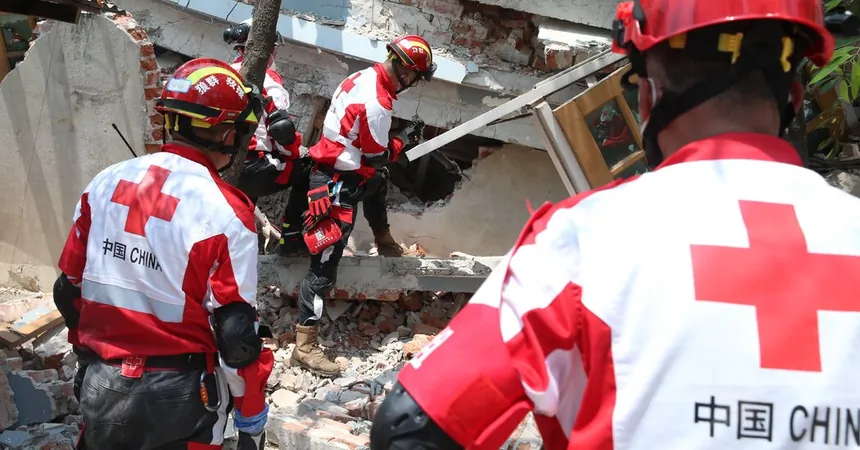
Myanmar Military Declares Temporary Truce Following Deadly Earthquake – But Can Anyone Trust Them?
2025-04-03
Author: Wai
In a surprising move, Myanmar's military declared a 21-day cease-fire on Wednesday, intending to facilitate relief and reconstruction efforts after a catastrophic earthquake shook the nation. This announcement came just a day after troops fired upon a Chinese Red Cross convoy, which was attempting to deliver essential food and medicine to quake-stricken survivors.
The military's attack on the humanitarian convoy, condemned by human rights activists globally, underscores the perils facing aid organizations in a country embroiled in civil conflict. Tragically, the 7.7-magnitude earthquake has claimed the lives of at least 2,700 individuals and left countless more in desperate need of assistance.
Despite this declaration of goodwill, doubts remain about whether this cease-fire will be honored. Rebel groups have reported that airstrikes by the military have continued unabated since the earthquake. These armed factions, including the National Unity Government, the shadow regime in exile, have proclaimed their own cease-fires, but the military junta, which came to power via a coup four years ago, is known for its unpredictable and violent behavior.
Senior General Min Aung Hlaing's office stated that the temporary cease-fire is effective from April 2 to April 22 and was designed to "express sympathy for affected citizens, facilitate humanitarian aid, and ensure stability during the recovery period." However, just a day prior, he maintained that military operations would persist as "necessary protective measures," raising eyebrows about the sincerity of his commitment.
UN Special Rapporteur on Human Rights in Myanmar, Tom Andrews, expressed outrage, stating, “There’s nothing necessary nor protective about attacking people trying to help others. Continuing to launch military offensives is just unacceptable.”
The incident involving the Chinese convoy occurred late Tuesday night near Ummati village in Shan State, where military forces opened fire after claiming they did not receive prior notification about the convoy's movement. While Gen. Zaw Min Tun, the military spokesman, justified the firing as a precautionary measure in an active conflict zone, this explanation is far from reassuring for those desperately trying to provide aid. The situation reflects a broader pattern of obstacles faced by humanitarian efforts, as military checkpoints and regulations frequently obstruct relief operations.
China, maintaining a close alliance with Myanmar, has been one of the first countries to mobilize aid, deploying search-and-rescue teams and contributing about $14 million in emergency assistance. In total, at least 15 countries, including the United States and Russia, have stepped forward to help. Organizations like the World Food Program and UNICEF are now on the ground in Mandalay and the neighboring Sagaing region. Notably, Taiwan's offer of a 126-member rescue team was reportedly declined by Myanmar's government.
Mandalay pro-democracy activist Tayzar San criticized the military junta for exploiting this natural disaster for political leverage rather than prioritizing effective rescue and relief initiatives. Reports from local residents indicate that the military is increasingly obstructing volunteers and aid efforts.
In a disheartening example, local charitable groups, such as the one led by Ko Thein Swe, have faced roadblocks while trying to deliver aid. After traveling from Thaton in Mon State to assist in search and rescue, they encountered a military checkpoint where they were denied passage without prior authorization and only allowed to proceed after bribing soldiers.
“At a time when so many people are suffering, they don’t just refuse to help; they lack the basic human decency to let others assist,” lamented Mr. Thein Swe. With humanitarian efforts hampered and a military with a history of heavy-handed tactics, the road to recovery for Myanmar's earthquake victims remains fraught with challenges. Will this cease-fire genuinely provide the lifeline needed, or is it merely a veil for continued hostilities? Only time will tell.




 Brasil (PT)
Brasil (PT)
 Canada (EN)
Canada (EN)
 Chile (ES)
Chile (ES)
 Česko (CS)
Česko (CS)
 대한민국 (KO)
대한민국 (KO)
 España (ES)
España (ES)
 France (FR)
France (FR)
 Hong Kong (EN)
Hong Kong (EN)
 Italia (IT)
Italia (IT)
 日本 (JA)
日本 (JA)
 Magyarország (HU)
Magyarország (HU)
 Norge (NO)
Norge (NO)
 Polska (PL)
Polska (PL)
 Schweiz (DE)
Schweiz (DE)
 Singapore (EN)
Singapore (EN)
 Sverige (SV)
Sverige (SV)
 Suomi (FI)
Suomi (FI)
 Türkiye (TR)
Türkiye (TR)
 الإمارات العربية المتحدة (AR)
الإمارات العربية المتحدة (AR)